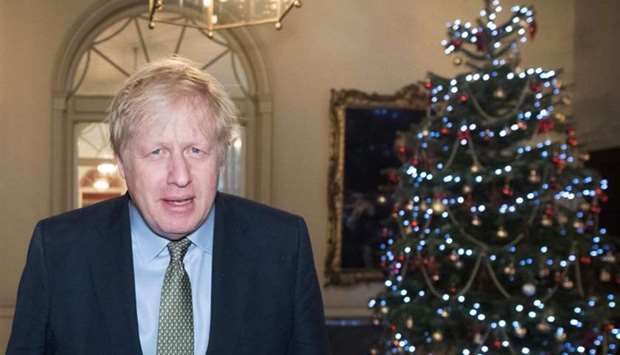UK Prime Minister Boris Johnson vowed Friday to "get Brexit done" after his thumping election victory cleared the way for Britain to leave the EU after years of political paralysis.
With all results declared for the 650-seat parliament in Thursday's momentous election, Johnson's Conservative party secured 365 seats -- its biggest majority since the heyday of Margaret Thatcher in the 1980s.Johnson proclaimed his triumph a political "earthquake" but while EU leaders welcomed the clear message from British voters on Brexit, they warned there was still a tough road ahead.
The main opposition Labour party suffered its worst performance since the 1930s, forcing its socialist leader Jeremy Corbyn to announce plans to step down, but Scottish Nationalists performed well, raising the prospect of another push for independence.
The pound shot up to its highest level since mid-2018 on hopes for a swift end to uncertainty over how, when -- or even if -- Britain was going to draw its often rocky five-decade involvement in the European project to a close.
Condemning more than three years of bitterly divisive political wrangling, Johnson vowed in his victory speech to "put an end to all that nonsense" and "get Brexit done on time by January 31, no ifs, no buts".
"We did it -- we pulled it off," the pro-Brexit figurehead of the original 2016 EU membership referendum told cheering supporters. "We broke the gridlock, we ended the gridlock, we smashed the roadblock."
Johnson visited Buckingham Palace on Friday to receive formal instructions from Queen Elizabeth II to form a new government.
Even some pro-European voters expressed relief at the election outcome, which the pro-Labour Daily Mirror newspaper called a "nightmare".
"At least it's clear," said lawyer Gordon Hockey. "It's not necessarily what I wanted but at least we know where we stand and Brexit will happen in some form or other."
Parliament's ratification next month of the EU-UK divorce deal will complete the first stage of the Brexit process, but both sides still need to thrash out a new trade and security agreement.
German Chancellor Angela Merkel said Britain would be an economic "competitor at our door" after it leaves the EU while French President Emmanuel Macron warned against "unfair" competition.
The result of Britain's third election in almost five years -- signals a personal victory for Johnson, a bombastic former London mayor and foreign minister who staked his political career on the vote.
US President Donald Trump tweeted his congratulations on a "great WIN!" and said London and Washington would be able to strike a "massive new trade deal" after Brexit.
"This deal has the potential to be far bigger and more lucrative than any deal that could be made with the E.U. Celebrate Boris!" he said.
Labour was heading to its worst result since 1935, losing 59 seats to 203, after what Corbyn admitted had been a "very disappointing night".
He said he would be stepping down after a period of "reflection", and would not be leading the party into the next election, which is due by 2024.
Corbyn had promised a second referendum on Brexit in a bid to appeal to half of British voters who voted in the 2016 referendum to stay in the EU.
But he had focused Labour's campaign on a radical programme of economic change, including re-nationalising some key industries, which failed to woo traditional voters.
Speaking early Friday, Corbyn defended his "manifesto of hope" and maintained his policies were "extremely popular" during the campaign.
But he said: "Brexit has so polarised and divided debate in this country, it has overridden so much of a normal political debate."
Corbyn is personally unpopular and dogged by accusations of sympathising with proscribed terror groups and failing to tackle anti-Semitism within the Labour party.
This is Labour's fourth successive electoral defeat -- and the second under Corbyn.
The anti-Brexit Liberal Democrats also did poorly and announced they would replace Jo Swinson as leader after she lost her seat in western Scotland to the Scottish National Party (SNP).
The Lib Dems were predicted to win 11 seats, down one on the last election in 2017.
By contrast the Scottish National Party (SNP), which wants to stop Brexit and deliver an independent Scotland, gained 13 seats to reach 48.
Its leader Nicola Sturgeon said her party's strong performance reinforced her case for holding a fresh Scottish independence referendum.
"The stunning election win from last night for the SNP renews, reinforces and strengthens the mandate we have from previous elections to offer the people of Scotland a choice over their future."
Johnson has then just 11 months to agree a new partnership with the EU before a post-Brexit transition period ends in December 2020.
But with a comfortable majority in parliament, analysts note he could choose to extend that time and negotiate a closer trade deal than previously envisaged.
"Ironically, this is a freer hand for Johnson to negotiate a softer version of Brexit," said Simon Hix of the London School of Economics.

